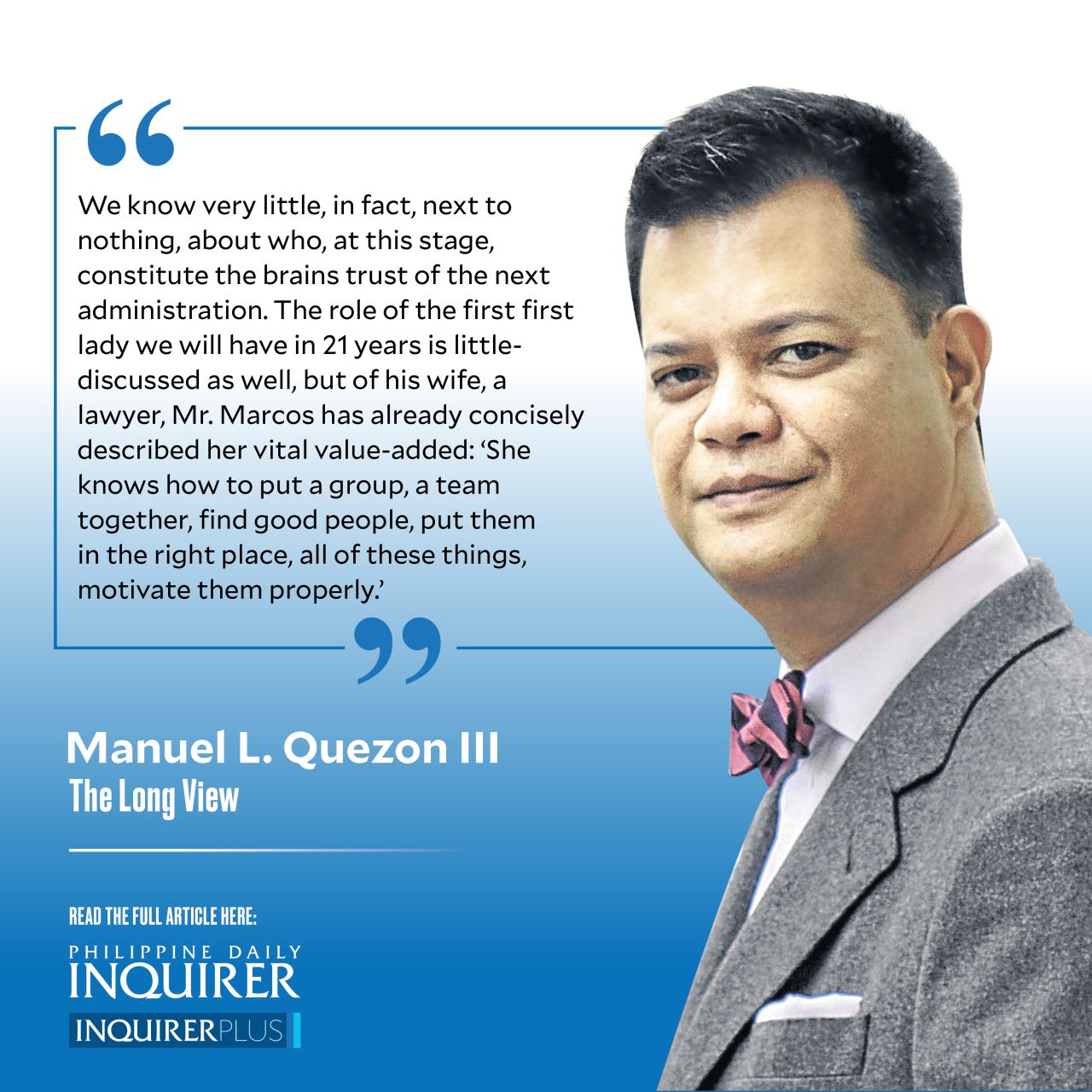Future president
During the campaign, it seemed to me that Ferdinand Marcos Jr. went through a kind of “Bam Aquinofication,” doing with hair and shirt-jac what Bam did with hair and glasses, to imprint himself with the aura of greatness. Since his return from Australia, a more relaxed, in-between look seems in place, as befits a future president who now has his own mandate.
Clumsy linguistic contortions (“presumptive president-elect”), simply because the congressional canvassing and proclamation aren’t done, are ridiculous. He is the next president. Before May 9 turned into May 10, the country knew it would be him. His is the third-highest first-term victory, percentage-wise, of any president in our electoral history. This is the only enduring point of comparison over time in a country with an ever-increasing population (the records stand as follows: Ramon Magsaysay, 68.90 percent in 1953; Manuel Quezon, 67.98 percent in 1935; Ferdinand Marcos Jr., 58.7 percent in 2022, which edges out Diosdado Macapagal’s 55.05 percent in 1961, a ranking held for 62 years).
It is a mandate secure enough to make everyone, including the members of both chambers of Congress themselves, blind to the conflict of interest or simply poor taste represented by Sen. Imee Marcos and House Majority Leader Martin Romualdez being members of the joint canvassing committee tasked to proclaim Ferdinand Marcos Jr. (their brother and first cousin, respectively) as president-elect.
We are so unfamiliar with this that it’s even been remarked, as if it was peculiar, that the highest-ranking senator, Robin Padilla (grandson of Jose Padilla, a Bulacan congressman-turned-actor who used the screen name Mario de Cordova), received far fewer votes than Marcos. In the first place, in a presidential election year, less attention is paid to the senatorial race, unlike in midterms, when the senatorial results are a referendum on the sitting president. So, it was that in the last pre-martial law elections, the top-ranking senators all received fewer votes than the winning presidential candidate: in 1961 (3,554,840 for Diosdado Macapagal; 3,489,658 for Raul Manglapus), in 1965 (3,861,324 for Ferdinand Marcos Sr.; 3,629,834 for Jovito Salonga), in 1969 (5,017,343 for Marcos Sr.; 4,826,809 for Arturo Tolentino) just like Marcos Sr.’s second term victory, this year was a landslide for Marcos Jr.
We know very little, in fact, next to nothing, about who, at this stage, constitute the brains trust of the next administration. The role of the first first lady we will have in 21 years is little-discussed as well, but of his wife, a lawyer, Mr. Marcos has already concisely described her vital value-added: “She knows how to put a group, a team together, find good people, put them in the right place, all of these things, motivate them properly.”
While undisclosed, the future president’s selection committee trusted by the future president and first lady has been said to be composed of Anton Lagdameo Jr., Iñigo Zobel, Benhur Abalos, and Vic Rodriguez, and that Ramon Ang has the next president’s ear and gives advice when asked.
To be sure, it’s been said that the next president wasn’t in a rush, indeed found it only proper, to announce his full Cabinet until and unless Congress proclaimed him president-elect first. But with no real controversy to accompany the overwhelming results, public opinion abhors a vacuum of information. In time-honored fashion, names were floated, only to be denied. Trial balloons? More jaded observers put it simply: The first names released are the ones least likely to make it past the final cut.
The political front has Benhur Abalos for Interior, Boying Remulla for Justice, and Vic Rodriguez for Executive Secretary, along with the first Cabinet member named, future vice president Sara Duterte for Education. It took a week (May 17-23) for them to accept, but Bienvenido Laguesma, an old hand at Labor, and Toots Ople, for the newly created Department of Migrant Workers. Between the two of them, they will likely avoid the hostility and recriminations in the current administration. The respected Arsenio Balisacan returns to the National Economic and Development Authority (Neda), with his bona fides secure on two fronts: as former Neda chief and because he’s a “good friend” of the incoming chief executive. “At last, a G.I.!” (or Genuine Ilocano) enthused the peanut gallery.
